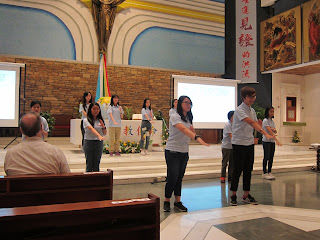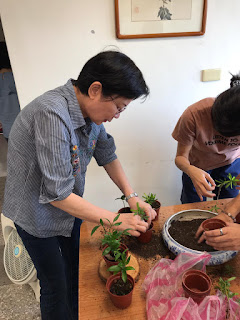I was in Taiwan last week on an ecological spirituality tour named “New Exodus”. As the Chinese name “同行覓主踪” suggests, it was aimed at seeking encounters with God through
close contact with Mother Nature.
Before we set off, we had been instructed to
read Pope Francis’ encyclical letter “On Care for our Common Home”. Initially,
I did not have much interest in the book and actually gave up reading several
times. Now that I have completed the tour, however, I find the book very
meaningful and inspiring. A few paragraphs are particularly enlightening as
they are so closely associated with the remarkable experiences I have been
through. The following is an account of what I now see as a miracle God has
worked in me.
Imagine a person of my age climbing up a
height of more than 800 metres in a matter of seven plus hours, during which we
were allowed only short pauses at wide intervals including a 15- minute lunch
break. The climb alone was challenging enough, given the steep gradient and the
ruggedness of the steps paved with sandy mud and scattered pebbles. It gradually
became more difficult and at times even dangerous as the climb proceeded. To
make the matter worse, the rain that we had brushed off as a drizzle had now
become heavier and the accompanying wind had also begun to gather speed and strength.
Despite the raincoat I had on, I felt water dripping down my forehead and into
my eyes.
The uphill path, strewn with puddles, became
more and more slippery. I thus had my eyes fixed on the steps every minute of
the climb, trying to decide where I should place my walking stick before
landing first on one foot and then the other. Often time I had both feet on the
same step to keep myself well balanced before climbing up another, thus
proceeding at a very slow pace.
When we had finally arrived at the peak,
the wind was blowing so violently that I was thrown off balance. I thought I was
going to fall down the stairs when a strong pair of arms caught me just in the
nick of time. It was a team member who had arrived there before us.
I ought to have felt ecstatic over the
conquest of the height. But my worry had not lessened as I had heard comment
about the increasing difficulty of the descent. And we were allowed time only enough for a
few mouthfuls of the sandwich and a quick change into dry clothes.
The descent, however, turned out to be less
hectic than expected. In spite of the ongoing wind and rain, I felt my body
weight less pressing. But my pair of legs had become so weak that they could
hardly support me. I became wobbly, swaying slightly from side to side out of
control. And when the descent finally ended and we settled down in the sheltered
quarters, I threw myself onto a stool, dead beat, speechless and drenched to
the skin.
Well, it was indeed a miracle that I had
completed the climb. I owed much to my team mates for their loving care and
support, without which I could have quit shortly after the journey had started.
This experience of mine has convinced me of
the truthfulness of the message implied in this quote from “On Care for our Common
Home” … “God in some way sought to limit
himself in such a way that many of the things we think of as evils, dangers or
sources of suffering, are in reality part of the pains of childbirth which he
uses to draw us into the act of cooperation with the Creator. … The
Spirit of God has filled the universe with possibilities and therefore, from
the very heart of things, something new can always emerge.”
Indeed, I now realize that through my
participation in the climb, God has taught me to overcome my fear of danger and
of suffering by cooperating with Him. God has also made me realize that there
are possibilities that I have previously been unaware of. My success in the
climb has proved to me that new things can emerge if only I dare to venture beyond
my capabilities and to meet new challenges.
























